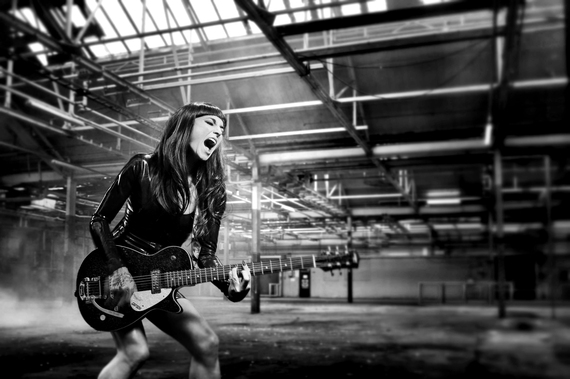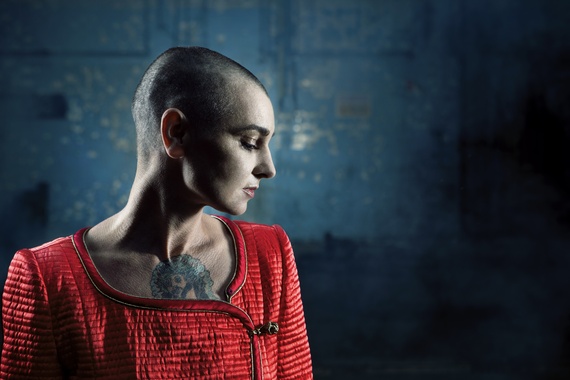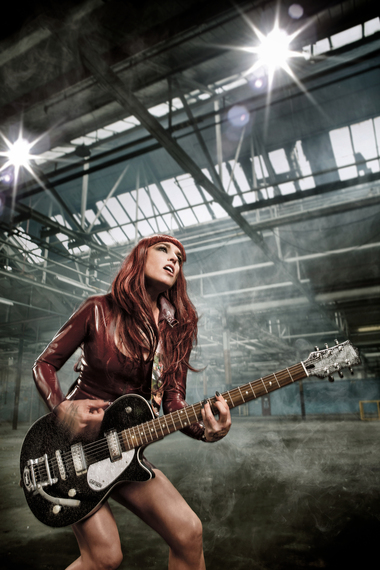
Photo by Donal Moloney
One can't help but notice the disclaimer strewn across her public website: "SINEAD'S MUSINGS. STRICTLY NOT FOR MINORS." It's true: The 5-foot-5, Grammy Award-winning Irish songstress takes distinct issue with the oversexualizing of minors in the music industry. "There's a weighing kind of overemphasis on sexuality, which disempowers music generally, because it silences all the other voices; it makes music a very powerless force for changing the world," O'Connor says. "It was the case in the '70s and '80s that people believed music could change the world. But now people aren't making music because they want to change the world; they're making music because they want to just make a ton of money."
A new worldwide tour and fresh lease on life have caused deep introspection for O'Connor. With three marriages under her belt and a fourth in progress, the mom of four has a new goal in life: putting herself first.
Sarah Toce: The title of your new album is I'm Not Bossy, I'm the Boss. It's very catchy. How did that title originate?
Sinéad O'Connor: Well, originally I had a different title, which was one of the songs on the album ["The Vishnu Room"]. But then, in February, the "Ban Bossy" campaign came about, and I was really inspired by the campaign as a female boss, because the way the music industry works, it really makes a musical artist -- male and female -- feel like we're working for the people who are actually working for us. It's very hard to be perceived as a boss, and behaving like a boss or wanting to be treated like one are not encouraged, you know? I could be wrong, but I imagine that that's exaggerated when you're female. And I've had issues around that a lot over the years, and the irony is that musical artists have enormous public voices, but behind the scenes we're voiceless, actually.
ST: What was it about the "Ban Bossy" campaign that inspired you to promote the messaging?
SO: I'm someone who was inspired by the campaign, but I'm not part of the campaign. Although the campaign was aimed at young girls to encourage them to be assertive, I actually found just as a boss, because of the campaign, I was able to take my power. For the first time I was able to actually realize that I actually am, in fact, the boss, and that it is OK for me to want to be treated like one. I actually didn't know that, really, until the "Ban Bossy" campaign, and then I went, "Hold on. I haven't been imagining this."
ST: A lot of the reviews of I'm Not Bossy, I'm the Boss are talking about the wigs that you wear in the promo art for the album. Speaking of gender equality and neutrality, was depicting yourself in such a feminine way a conscious decision for this project?
SO: It was pure publicity. It was really done purely to draw attention to the album, because I knew that nobody had ever seen me looking like a woman and, you know, looking like a girl and having hair and dressing sexy. And I knew that if I did it, it would draw a lot of attention to the album that the album would not otherwise have gotten.
ST: The first single off I'm Not Bossy, I'm the Boss is "Take Me to Church." What does this song symbolize for you?
SO: Really it's about relationships; it's not about religion at all. There are four characters on the record -- female characters -- and then there's me. The majority of songs are not personal. There's one central character who turns up quite a lot, and she's having a series of conversations either with a particular man or with herself. And "Take Me to Church" is kind of what I call her "Eureka!" moment, if you like. She's really singing about relationships. It's referencing the song from My Fair Lady, which is called "Get Me to the Church on Time," which is a song about getting married. So she's talking really about getting married, and the getting-her-to-church part is about getting married or having a relationship.
ST: And then talking again about self-identity and self-worth -- I think those are big things going on on the album, obviously -- do you feel, as an artist, that you're more in your skin now than on previous recordings? Or is it a progression?
SO: I suppose I just do [feel more comfortable in my own skin] generally, as a performer, and everything. Yeah, not necessarily just in the studio, though; I suppose as a performer and as a writer and everything as well.

Photo by Donal Moloney
ST: Do you have a true-blue method for your songwriting?
SO: Not really. I mean, my favorite way of working is if somebody gives me a piece of music, because I'm quite limited as a player, so it's my favorite thing if somebody gives me a piece of music, and then I can write lyrics and melodies. That's what I like to do. And then you can do that anywhere, because people just email you tracks.
ST: Speaking of working anywhere, what do you do in your downtime? Is there anything that you really enjoy outside music?
SO: Well, just hanging out with my kids, really. And, to be honest, it's something I'm having to look at at the moment. The trouble when you have a job like mine is it's your social life as well, so I need to actually [find] something to do in my downtime when my kids are at school. I suppose the danger when you have a job that involves writing is you can be a bit isolated.
ST: Is there anything that you want the fans to take away from this specific album?
SO: Generally, I supposed what I want is for them to just like the record for the songs. I think they're funky songs; they're lovely songs that I love. I would like to think maybe people would like to come to our show as a result of the songs. If there's a message in the record at all -- which wasn't intended; it would be subconscious -- there's a safety message within it, if you listen very carefully through the sequencing of the central character. There's a central character who appears more often than the others, and if you listen through to her journey, you realize that she is a safety warning for females, specifically for females. She's a sexual-safety warning.
ST: What made you fall in love with the Chicago blues?
SO: I love songs, and I love songwriting, and there's a standard of songwriting within Chicago blues in particular. I don't like the sad blues, necessarily; the Chicago blues is what I like, which is the kind of blues you can dance to -- people like Magic Sam and Buddy Guy and that. And there's a standard of songwriting that, when you start immersing yourself in those types of songs, it raises your own bar as a songwriter. There's also simplicity in the songwriting. It's much harder to be simple than it is to be complicated.

Photo by Donal Moloney
ST: How do you feel the music industry has changed since your first album in 1987, and how do you think it might continue to change?
SO: I don't know. I suppose the biggest change to me is this kind of very oversexualizing of everything. Not that anyone wants to take the sex out of rock 'n' roll, you know -- that would be ludicrous -- but it seems that everything now, it's like the sexuality is the only voice; everything else is gone. And what freaks me slightly is that it's the artists who look like minors and whose audience are minors, and they're the ones that are the most sexualized, that there's a certain element within the entertainment industry which is, whether unwittingly or not, sexualizing minors via this kind of oversexualizing of artists who look like minors and whose audience are minors.
There's a weighing kind of overemphasis on sexuality, which disempowers music generally, because it silences all the other voices; it makes music a very powerless force for changing the world. It was the case in the 70s and 80s that people believed music could change the world. But now people aren't making music because they want to change the world; they're making music because they want to just make a ton of money. There's been an awful lot of power taken out of music, and then the sexuality is being sold to the artists as power when in fact it's not; it's a way of hypnotizing their audience.
ST: Any hopes for the future for you after this album? What do you plan to do?
SO: What I hope is to really focus on being a songwriter. I'd love to write songs for other people; that's something I'd really like to start doing. I'm hoping to move in that direction where even when I'm in between albums of my own, I could still be writing songs for other people in other situations.
Find out more information about Sinéad O'Connor, including upcoming tour stops in support of her new album, at sineadoconnor.com.